
klavis
Klavis AI (YC X25): MCP integration platforms that let AI agents use tools reliably at any scale
Stars: 5624
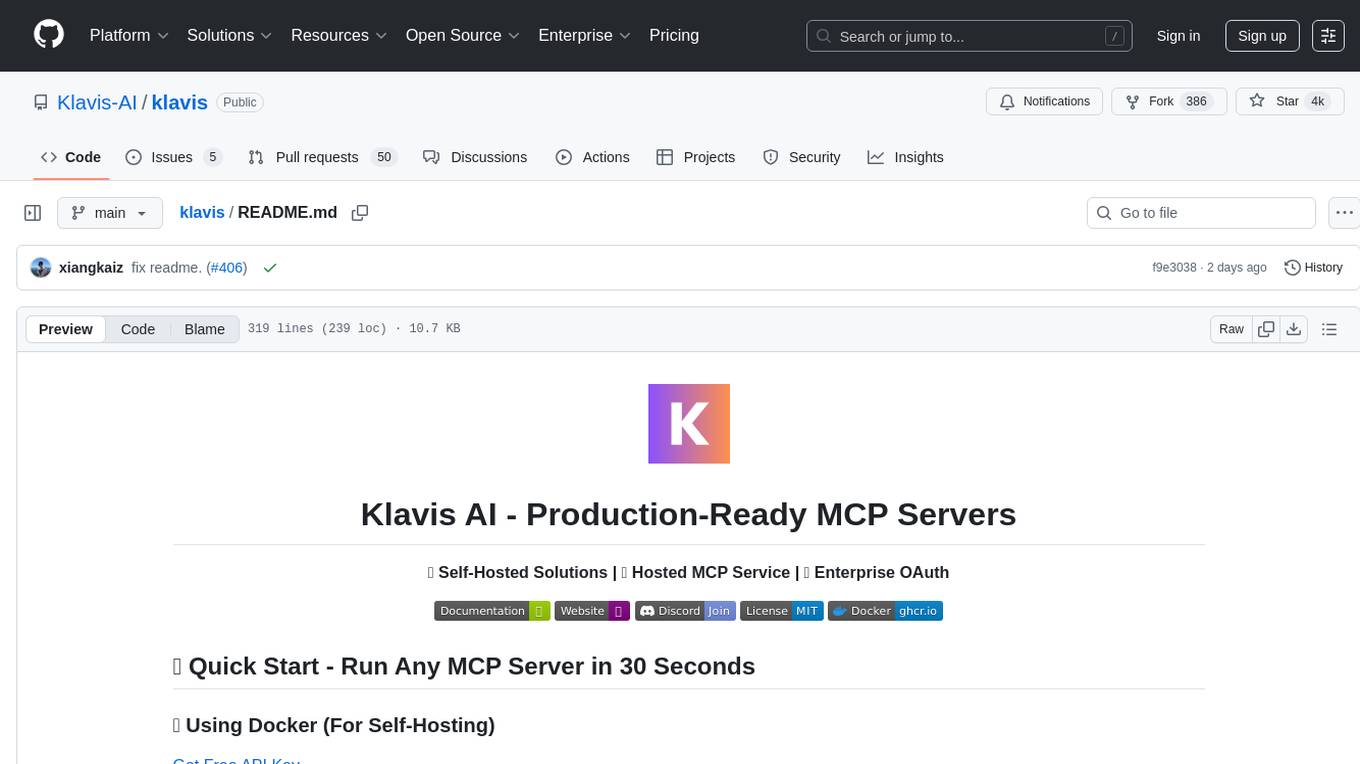
Klavis AI is a production-ready solution for managing Multiple Communication Protocol (MCP) servers. It offers self-hosted solutions and a hosted service with enterprise OAuth support. With Klavis AI, users can easily deploy and manage over 50 MCP servers for various services like GitHub, Gmail, Google Sheets, YouTube, Slack, and more. The tool provides instant access to MCP servers, seamless authentication, and integration with AI frameworks, making it ideal for individuals and businesses looking to streamline their communication and data management workflows.
README:
Option 1: Cloud-hosted - klavis.ai
# Run any MCP Integration
docker pull ghcr.io/klavis-ai/github-mcp-server:latest
docker run -p 5000:5000 ghcr.io/klavis-ai/github-mcp-server:latest
# Install Open Source Strata locally
pipx install strata-mcp
strata add --type stdio playwright npx @playwright/mcp@latest# Python SDK
from klavis import Klavis
from klavis.types import McpServerName
klavis = Klavis(api_key="your-key")
# Create Strata instance
strata = klavis_client.mcp_server.create_strata_server(
user_id="user123",
servers=[McpServerName.GMAIL, McpServerName.SLACK],
)
# Or use individual MCP servers
gmail = klavis.mcp_server.create_server_instance(
server_name=McpServerName.GMAIL,
user_id="user123",
)// TypeScript SDK
import { KlavisClient, McpServerName } from 'klavis';
const klavis = new KlavisClient({ apiKey: 'your-api-key' });
// Create Strata instance
const strata = await klavis.mcpServer.createStrataServer({
userId: "user123",
servers: [Klavis.McpServerName.Gmail, Klavis.McpServerName.Slack],
});
// Or use individual MCP servers
const gmail = await klavis.mcpServer.createServerInstance({
serverName: McpServerName.GMAIL,
userId: "user123"
});# Create Strata server
curl -X POST "https://api.klavis.ai/v1/mcp-server/strata" \
-H "Authorization: Bearer your-api-key" \
-H "Content-Type: application/json" \
-d '{
"user_id": "user123",
"servers": ["GMAIL", "SLACK"]
}'
# Create individual MCP server
curl -X POST "https://api.klavis.ai/v1/mcp-server/instance" \
-H "Authorization: Bearer your-api-key" \
-H "Content-Type: application/json" \
-d '{
"server_name": "GMAIL",
"user_id": "user123"
}'Made with ❤️ by the Klavis Team
For Tasks:
Click tags to check more tools for each tasksFor Jobs:
Alternative AI tools for klavis
Similar Open Source Tools

klavis
Klavis AI is a production-ready solution for managing Multiple Communication Protocol (MCP) servers. It offers self-hosted solutions and a hosted service with enterprise OAuth support. With Klavis AI, users can easily deploy and manage over 50 MCP servers for various services like GitHub, Gmail, Google Sheets, YouTube, Slack, and more. The tool provides instant access to MCP servers, seamless authentication, and integration with AI frameworks, making it ideal for individuals and businesses looking to streamline their communication and data management workflows.
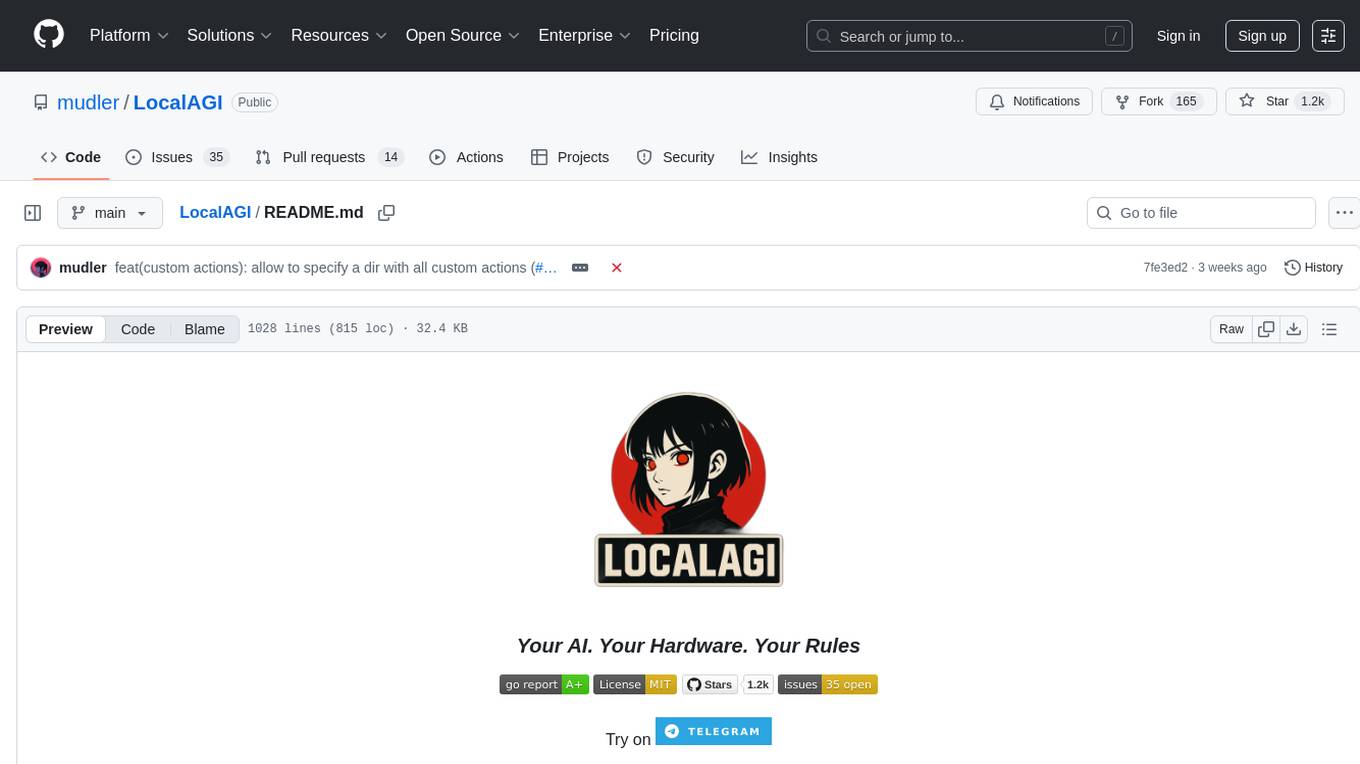
LocalAGI
LocalAGI is a powerful, self-hostable AI Agent platform that allows you to design AI automations without writing code. It provides a complete drop-in replacement for OpenAI's Responses APIs with advanced agentic capabilities. With LocalAGI, you can create customizable AI assistants, automations, chat bots, and agents that run 100% locally, without the need for cloud services or API keys. The platform offers features like no-code agents, web-based interface, advanced agent teaming, connectors for various platforms, comprehensive REST API, short & long-term memory capabilities, planning & reasoning, periodic tasks scheduling, memory management, multimodal support, extensible custom actions, fully customizable models, observability, and more.
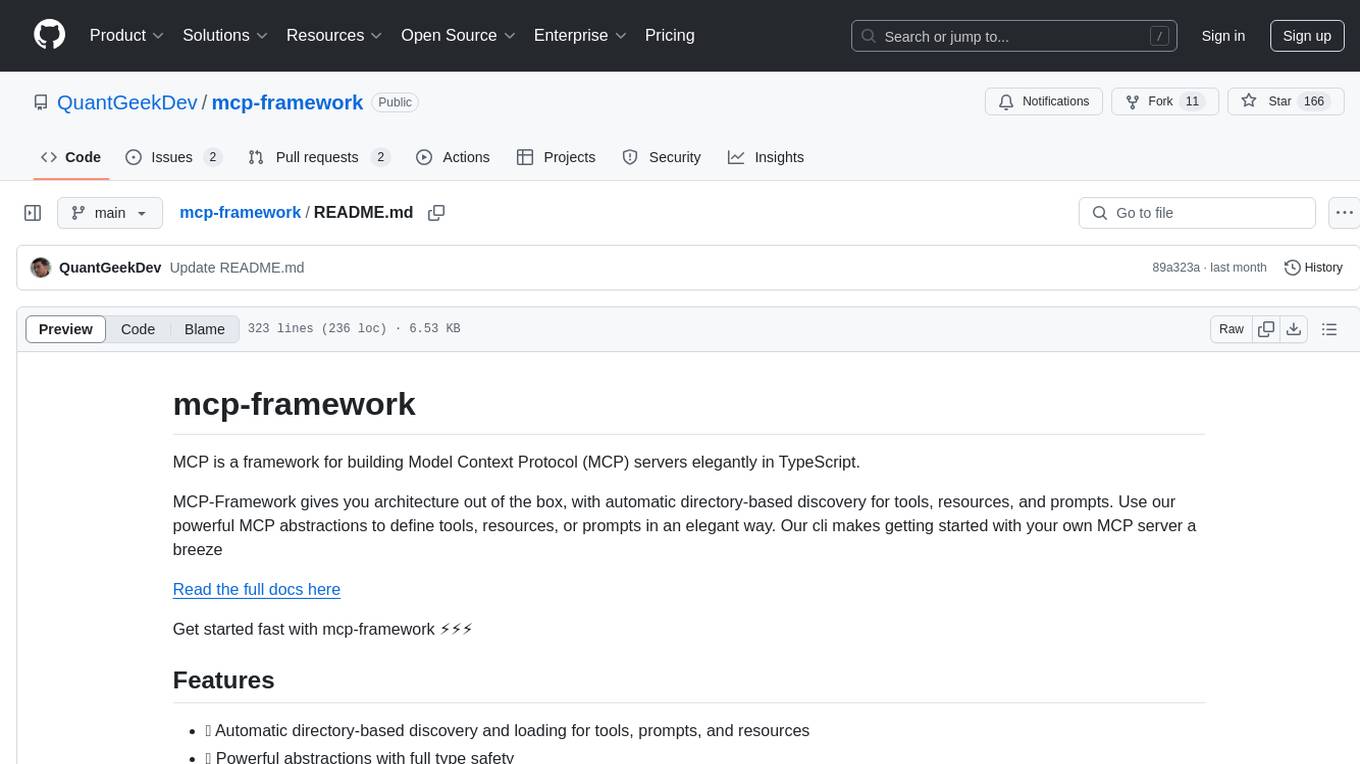
mcp-framework
MCP-Framework is a TypeScript framework for building Model Context Protocol (MCP) servers with automatic directory-based discovery for tools, resources, and prompts. It provides powerful abstractions, simple server setup, and a CLI for rapid development and project scaffolding.
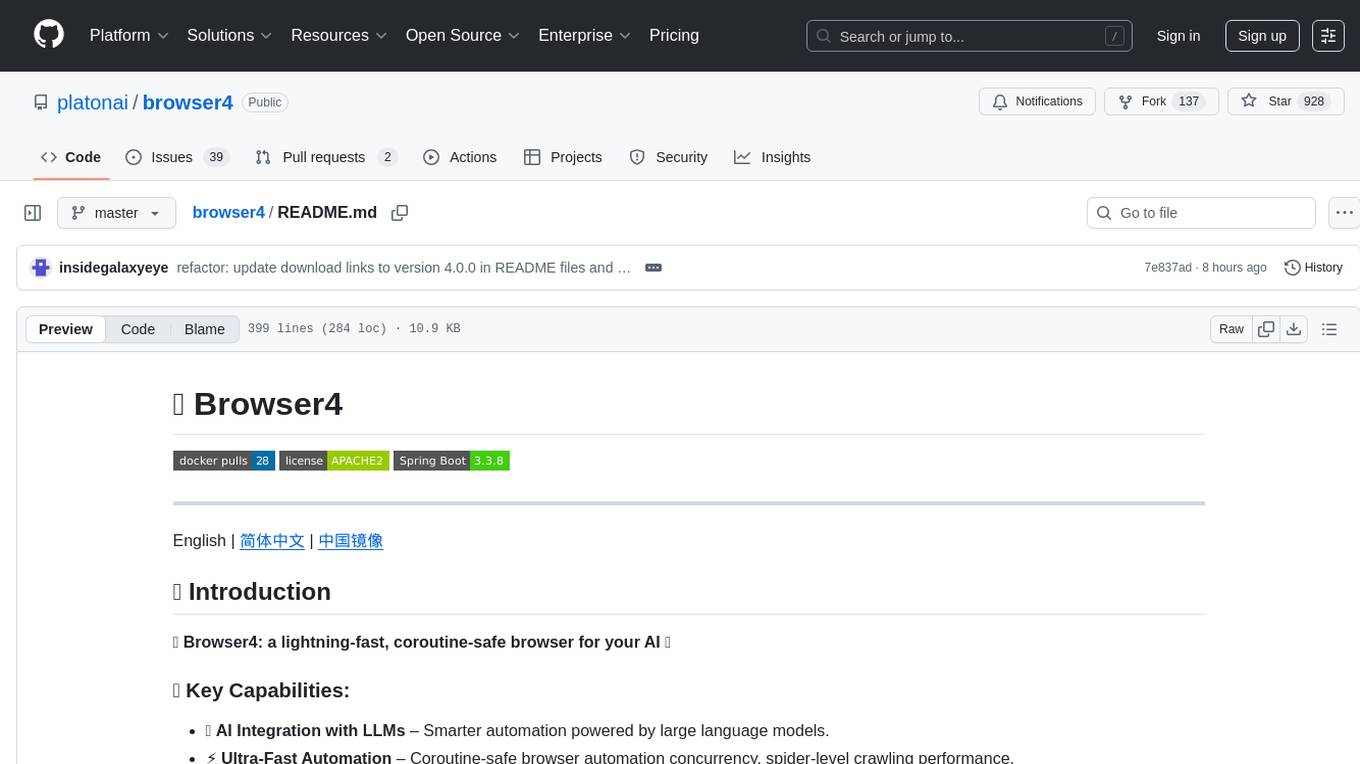
browser4
Browser4 is a lightning-fast, coroutine-safe browser designed for AI integration with large language models. It offers ultra-fast automation, deep web understanding, and powerful data extraction APIs. Users can automate the browser, extract data at scale, and perform tasks like summarizing products, extracting product details, and finding specific links. The tool is developer-friendly, supports AI-powered automation, and provides advanced features like X-SQL for precise data extraction. It also offers RPA capabilities, browser control, and complex data extraction with X-SQL. Browser4 is suitable for web scraping, data extraction, automation, and AI integration tasks.
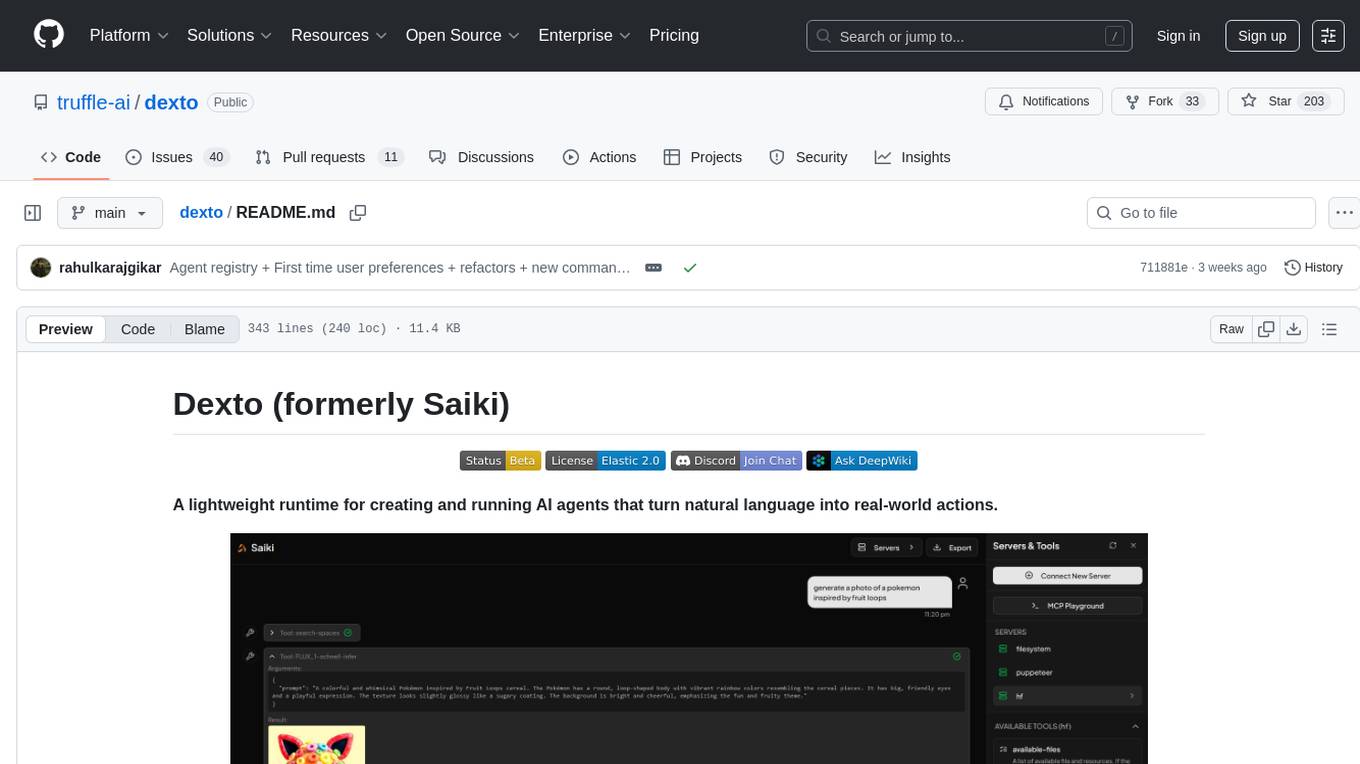
dexto
Dexto is a lightweight runtime for creating and running AI agents that turn natural language into real-world actions. It serves as the missing intelligence layer for building AI applications, standalone chatbots, or as the reasoning engine inside larger products. Dexto features a powerful CLI and Web UI for running AI agents, supports multiple interfaces, allows hot-swapping of LLMs from various providers, connects to remote tool servers via the Model Context Protocol, is config-driven with version-controlled YAML, offers production-ready core features, extensibility for custom services, and enables multi-agent collaboration via MCP and A2A.
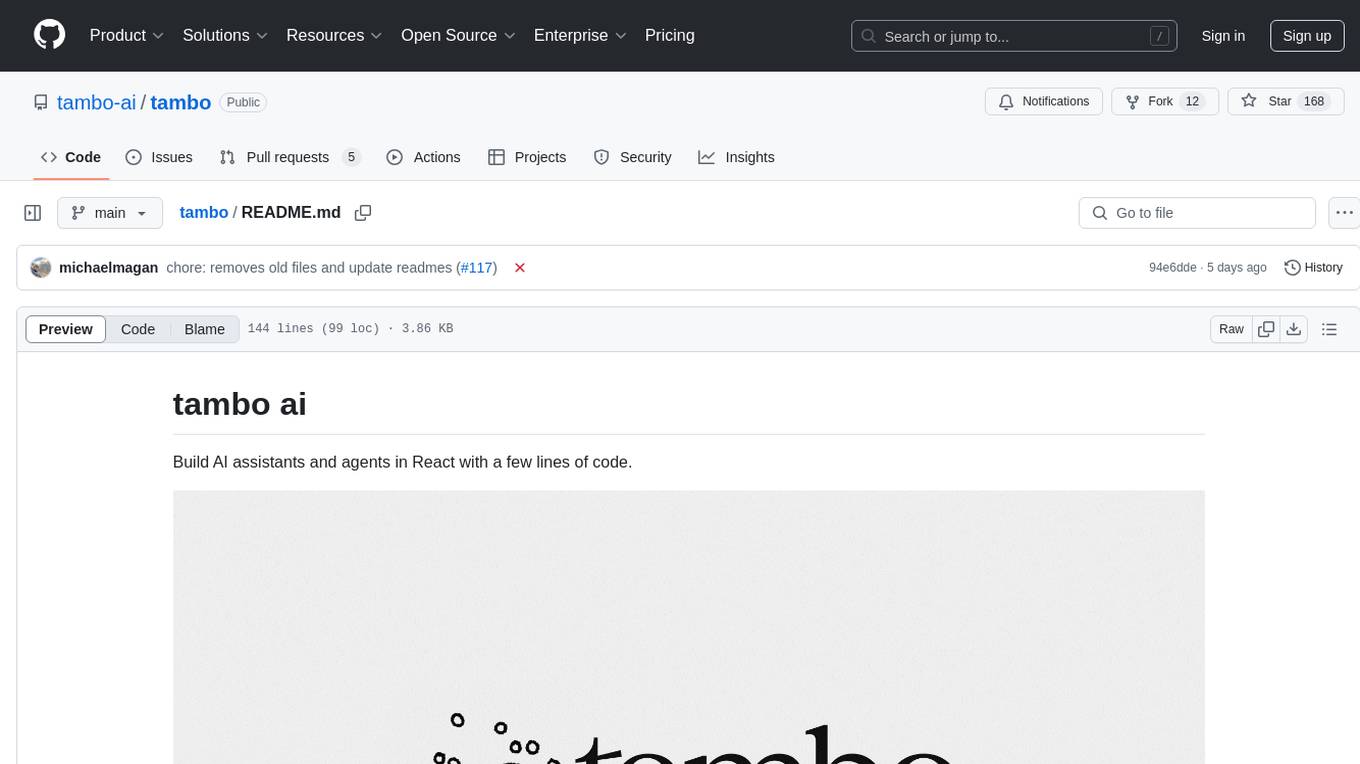
tambo
tambo ai is a React library that simplifies the process of building AI assistants and agents in React by handling thread management, state persistence, streaming responses, AI orchestration, and providing a compatible React UI library. It eliminates React boilerplate for AI features, allowing developers to focus on creating exceptional user experiences with clean React hooks that seamlessly integrate with their codebase.
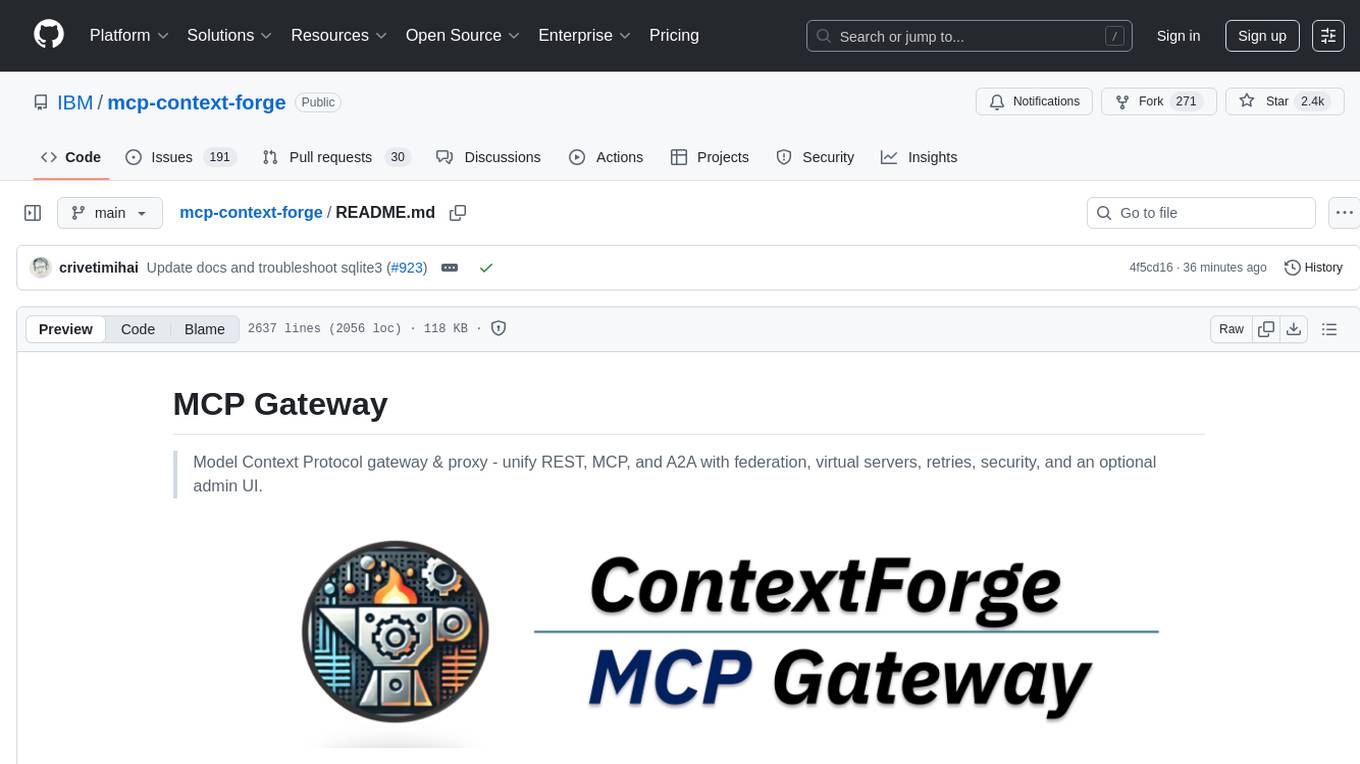
mcp-context-forge
MCP Context Forge is a powerful tool for generating context-aware data for machine learning models. It provides functionalities to create diverse datasets with contextual information, enhancing the performance of AI algorithms. The tool supports various data formats and allows users to customize the context generation process easily. With MCP Context Forge, users can efficiently prepare training data for tasks requiring contextual understanding, such as sentiment analysis, recommendation systems, and natural language processing.
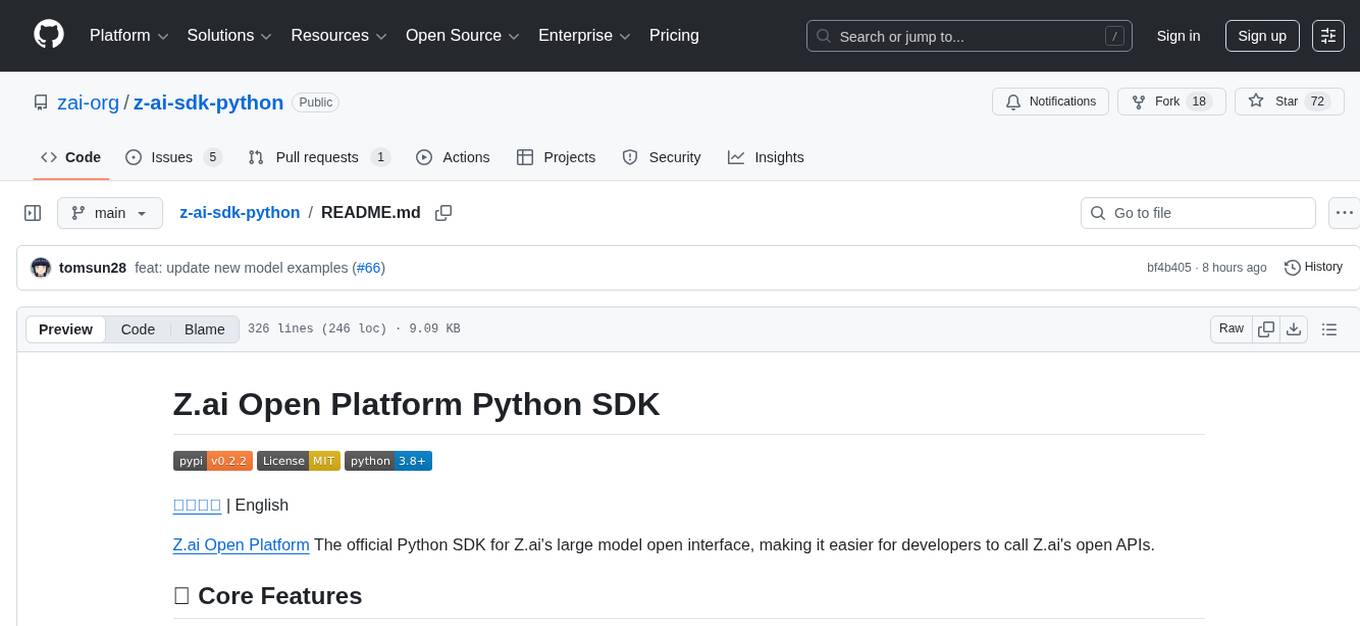
z-ai-sdk-python
Z.ai Open Platform Python SDK is the official Python SDK for Z.ai's large model open interface, providing developers with easy access to Z.ai's open APIs. The SDK offers core features like chat completions, embeddings, video generation, audio processing, assistant API, and advanced tools. It supports various functionalities such as speech transcription, text-to-video generation, image understanding, and structured conversation handling. Developers can customize client behavior, configure API keys, and handle errors efficiently. The SDK is designed to simplify AI interactions and enhance AI capabilities for developers.
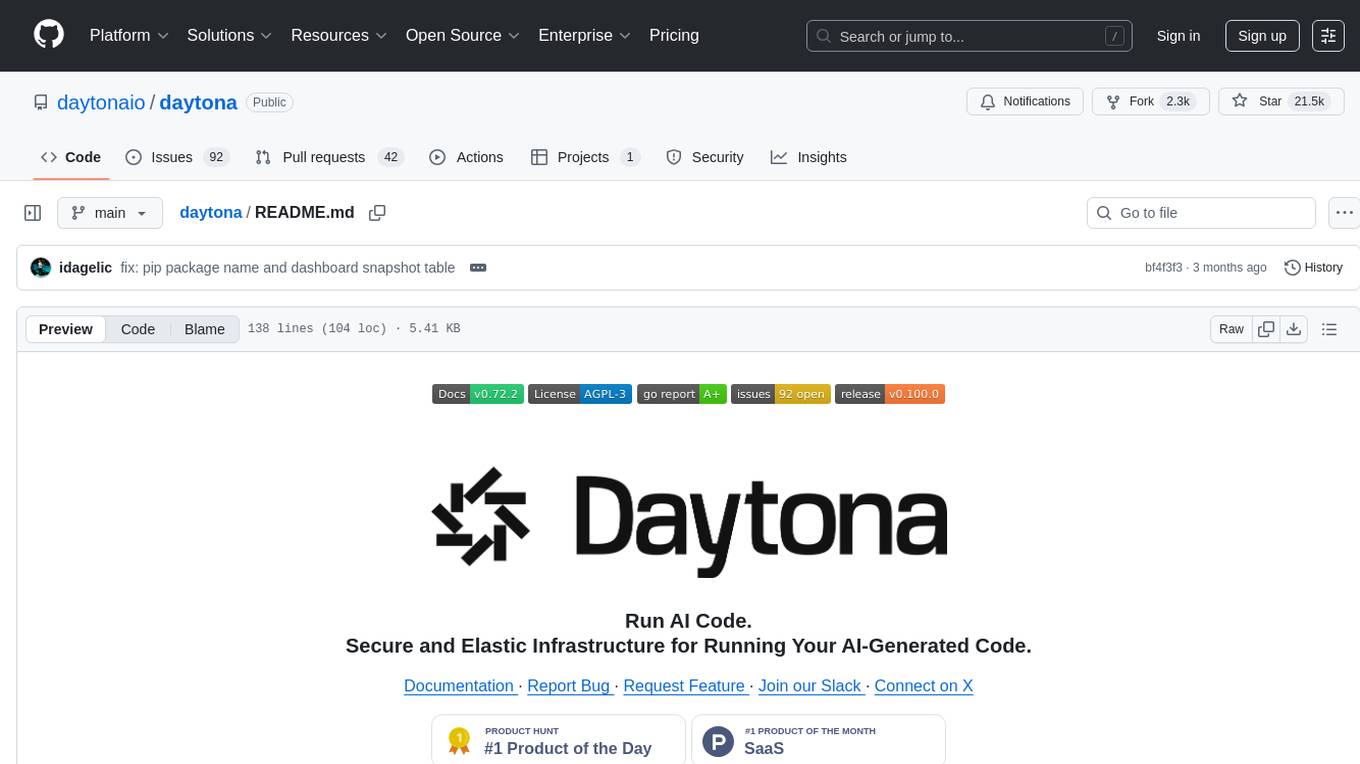
daytona
Daytona is a secure and elastic infrastructure tool designed for running AI-generated code. It offers lightning-fast infrastructure with sub-90ms sandbox creation, separated and isolated runtime for executing AI code with zero risk, massive parallelization for concurrent AI workflows, programmatic control through various APIs, unlimited sandbox persistence, and OCI/Docker compatibility. Users can create sandboxes using Python or TypeScript SDKs, run code securely inside the sandbox, and clean up the sandbox after execution. Daytona is open source under the GNU Affero General Public License and welcomes contributions from developers.
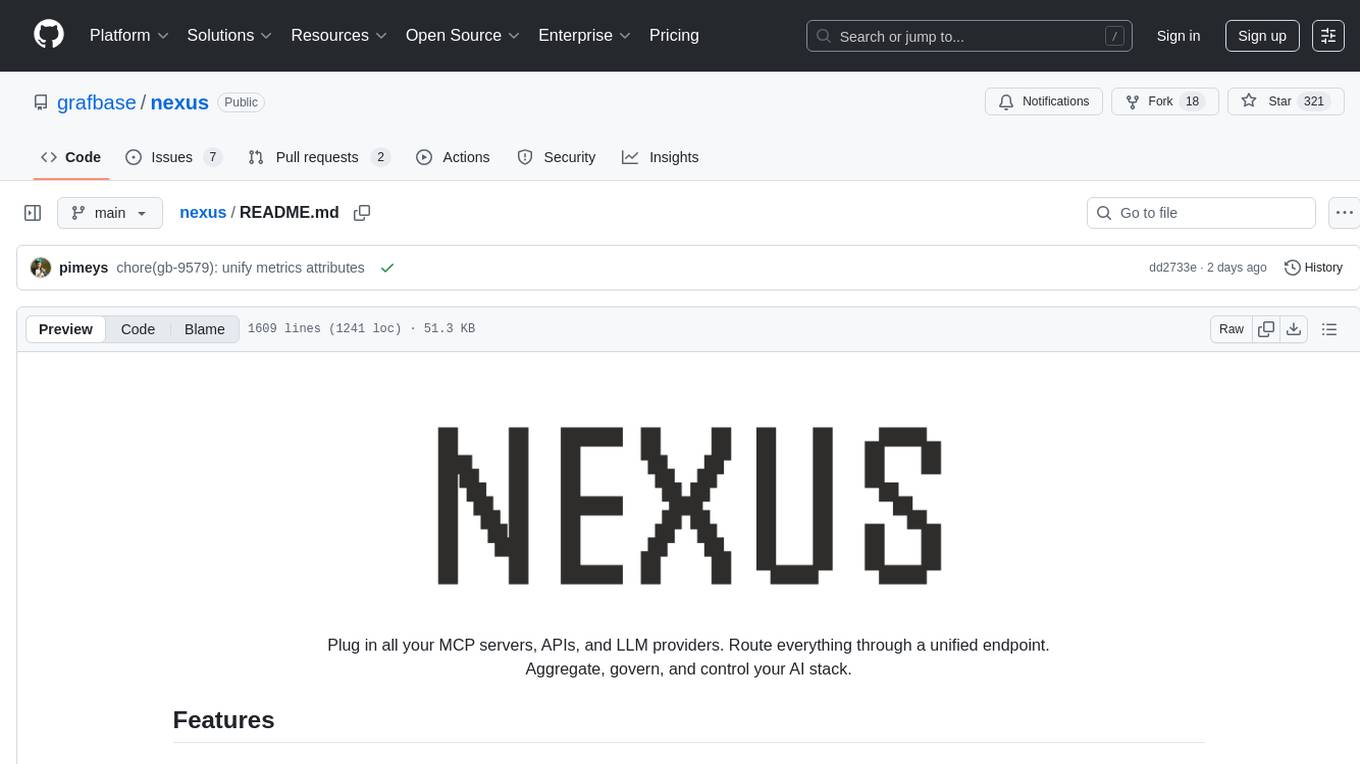
nexus
Nexus is a tool that acts as a unified gateway for multiple LLM providers and MCP servers. It allows users to aggregate, govern, and control their AI stack by connecting multiple servers and providers through a single endpoint. Nexus provides features like MCP Server Aggregation, LLM Provider Routing, Context-Aware Tool Search, Protocol Support, Flexible Configuration, Security features, Rate Limiting, and Docker readiness. It supports tool calling, tool discovery, and error handling for STDIO servers. Nexus also integrates with AI assistants, Cursor, Claude Code, and LangChain for seamless usage.
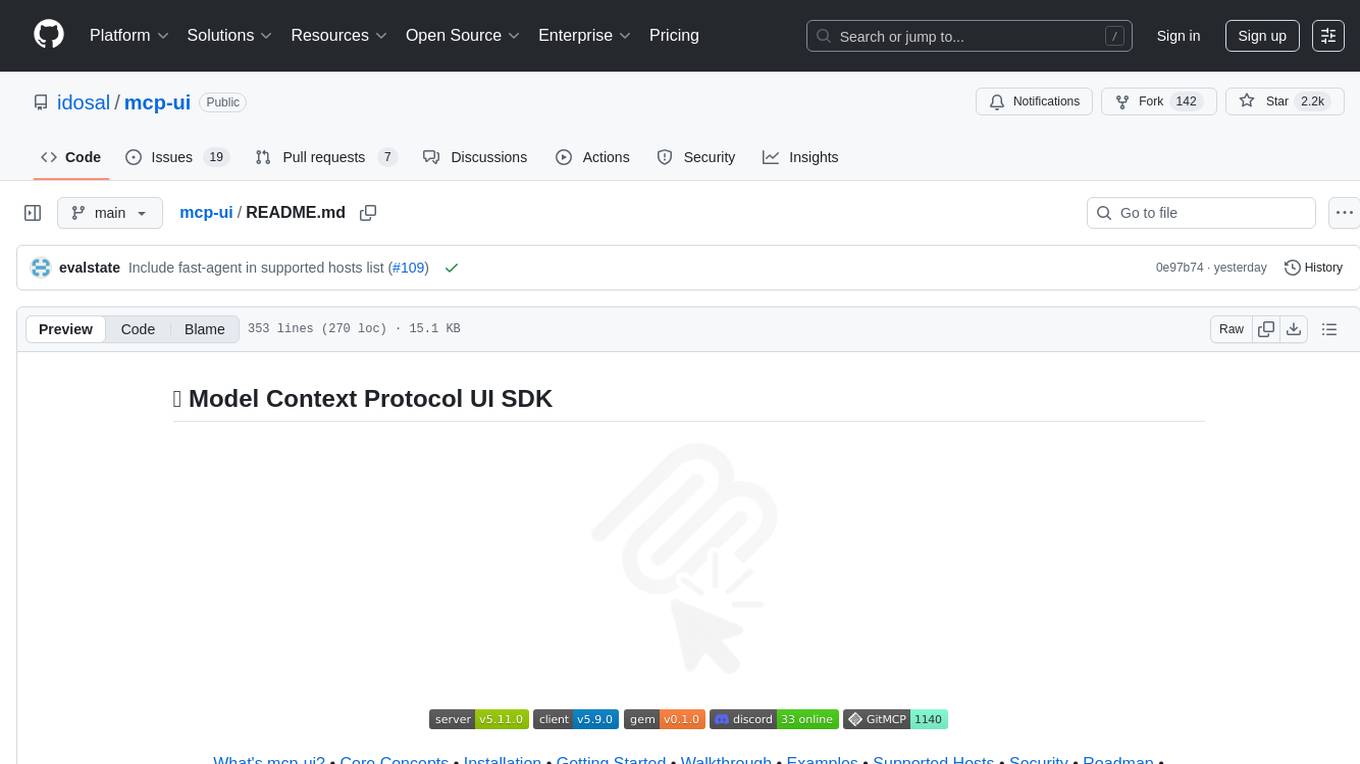
mcp-ui
mcp-ui is a collection of SDKs that bring interactive web components to the Model Context Protocol (MCP). It allows servers to define reusable UI snippets, render them securely in the client, and react to their actions in the MCP host environment. The SDKs include @mcp-ui/server (TypeScript) for generating UI resources on the server, @mcp-ui/client (TypeScript) for rendering UI components on the client, and mcp_ui_server (Ruby) for generating UI resources in a Ruby environment. The project is an experimental community playground for MCP UI ideas, with rapid iteration and enhancements.
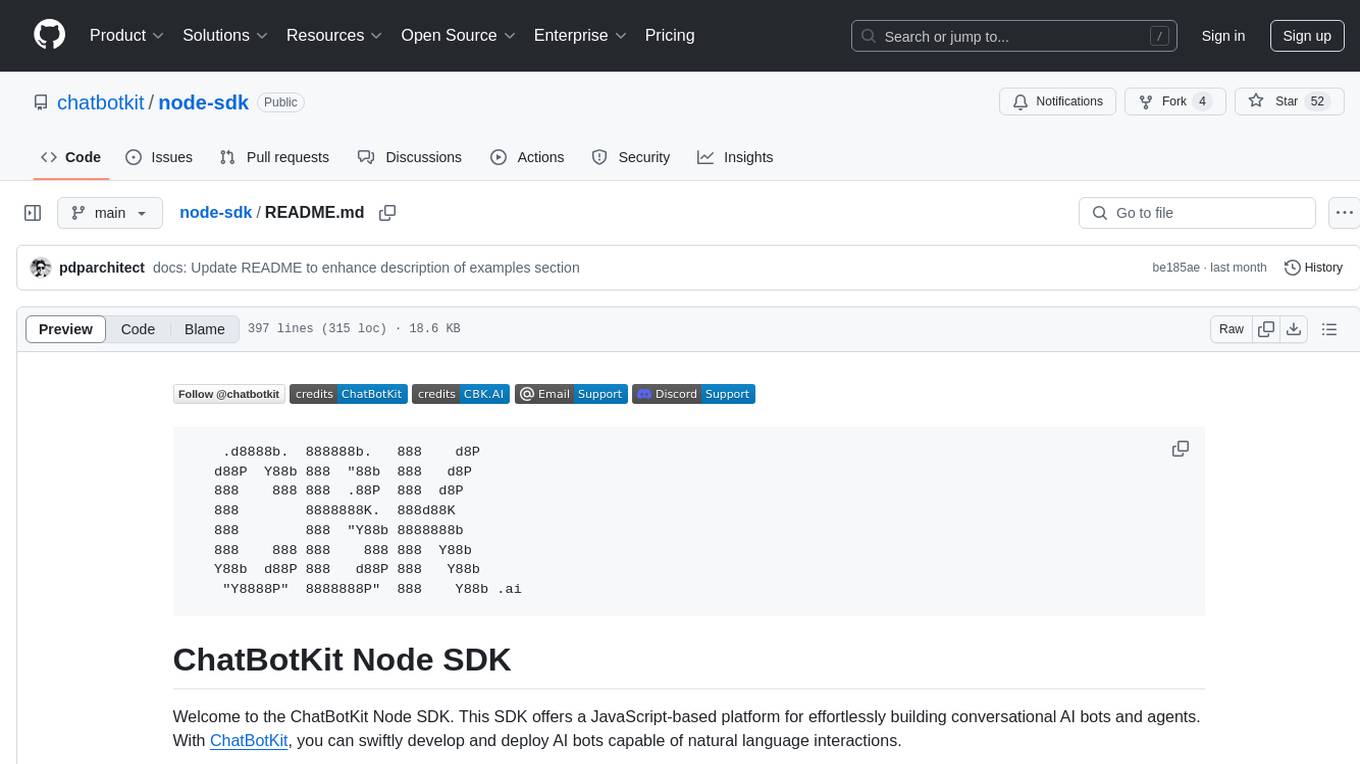
node-sdk
The ChatBotKit Node SDK is a JavaScript-based platform for building conversational AI bots and agents. It offers easy setup, serverless compatibility, modern framework support, customizability, and multi-platform deployment. With capabilities like multi-modal and multi-language support, conversation management, chat history review, custom datasets, and various integrations, this SDK enables users to create advanced chatbots for websites, mobile apps, and messaging platforms.
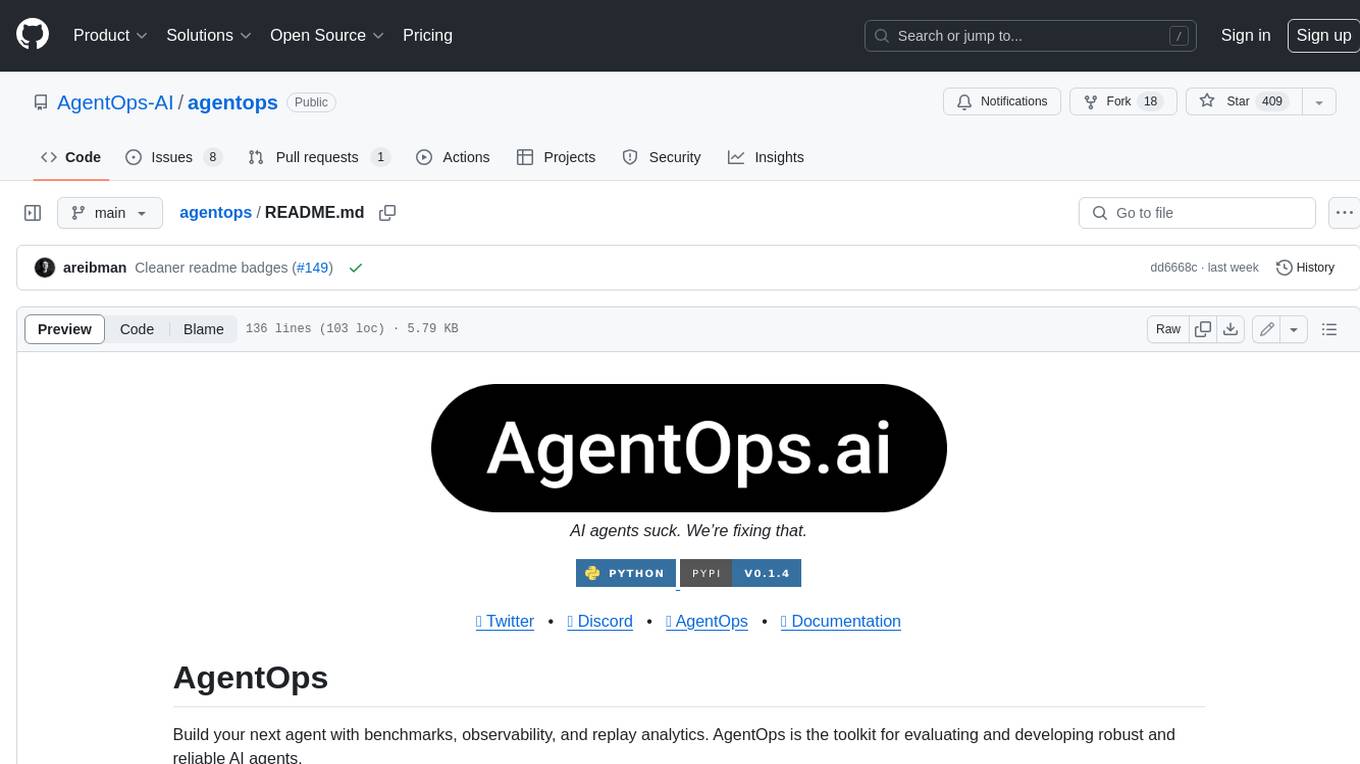
agentops
AgentOps is a toolkit for evaluating and developing robust and reliable AI agents. It provides benchmarks, observability, and replay analytics to help developers build better agents. AgentOps is open beta and can be signed up for here. Key features of AgentOps include: - Session replays in 3 lines of code: Initialize the AgentOps client and automatically get analytics on every LLM call. - Time travel debugging: (coming soon!) - Agent Arena: (coming soon!) - Callback handlers: AgentOps works seamlessly with applications built using Langchain and LlamaIndex.
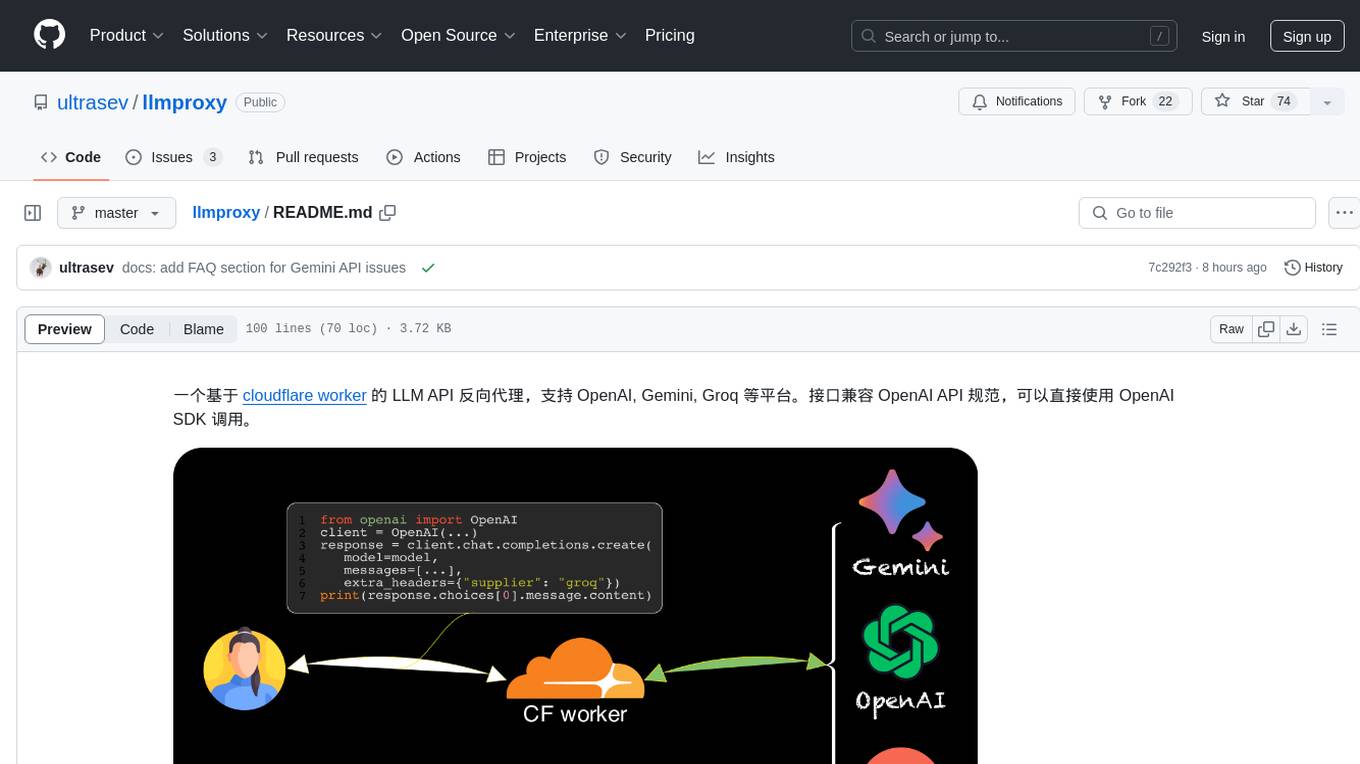
llmproxy
llmproxy is a reverse proxy for LLM API based on Cloudflare Worker, supporting platforms like OpenAI, Gemini, and Groq. The interface is compatible with the OpenAI API specification and can be directly accessed using the OpenAI SDK. It provides a convenient way to interact with various AI platforms through a unified API endpoint, enabling seamless integration and usage in different applications.
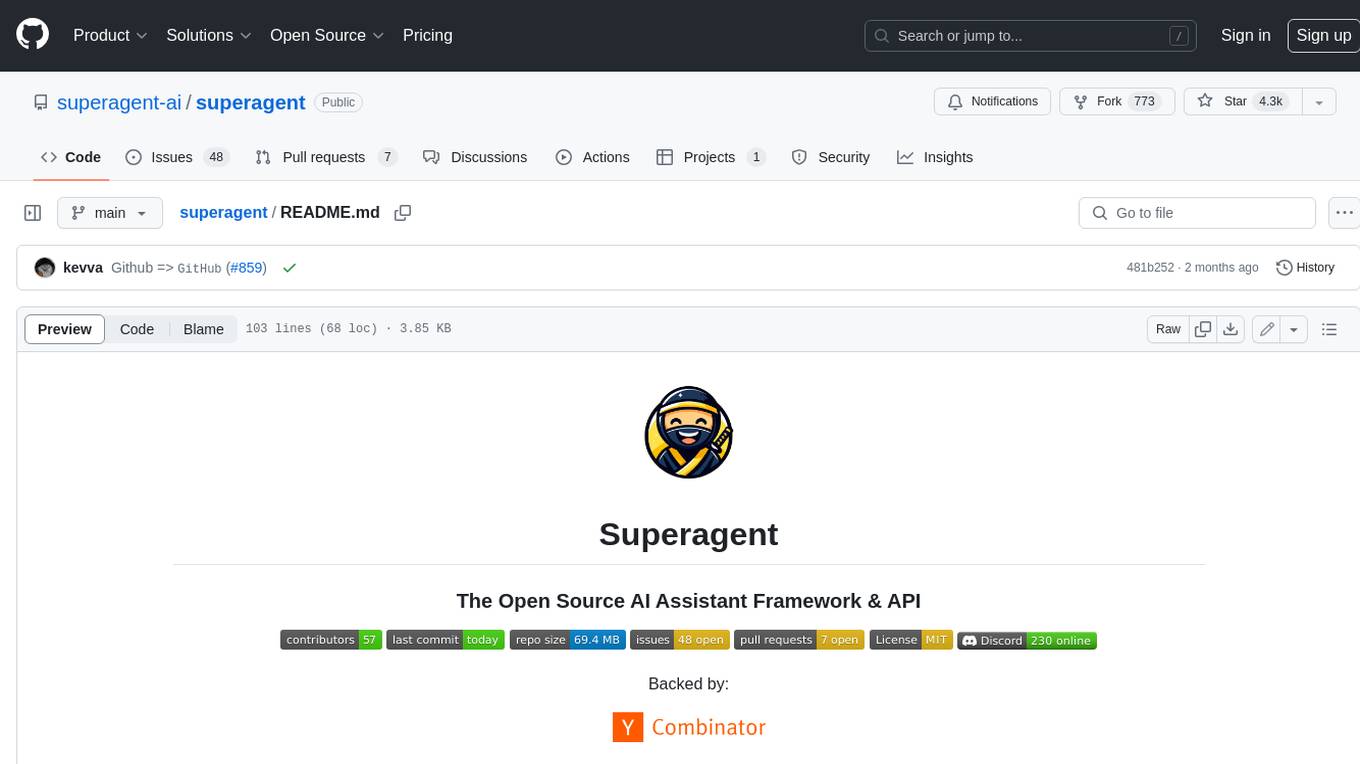
superagent
Superagent is an open-source AI assistant framework and API that allows developers to add powerful AI assistants to their applications. These assistants use large language models (LLMs), retrieval augmented generation (RAG), and generative AI to help users with a variety of tasks, including question answering, chatbot development, content generation, data aggregation, and workflow automation. Superagent is backed by Y Combinator and is part of YC W24.
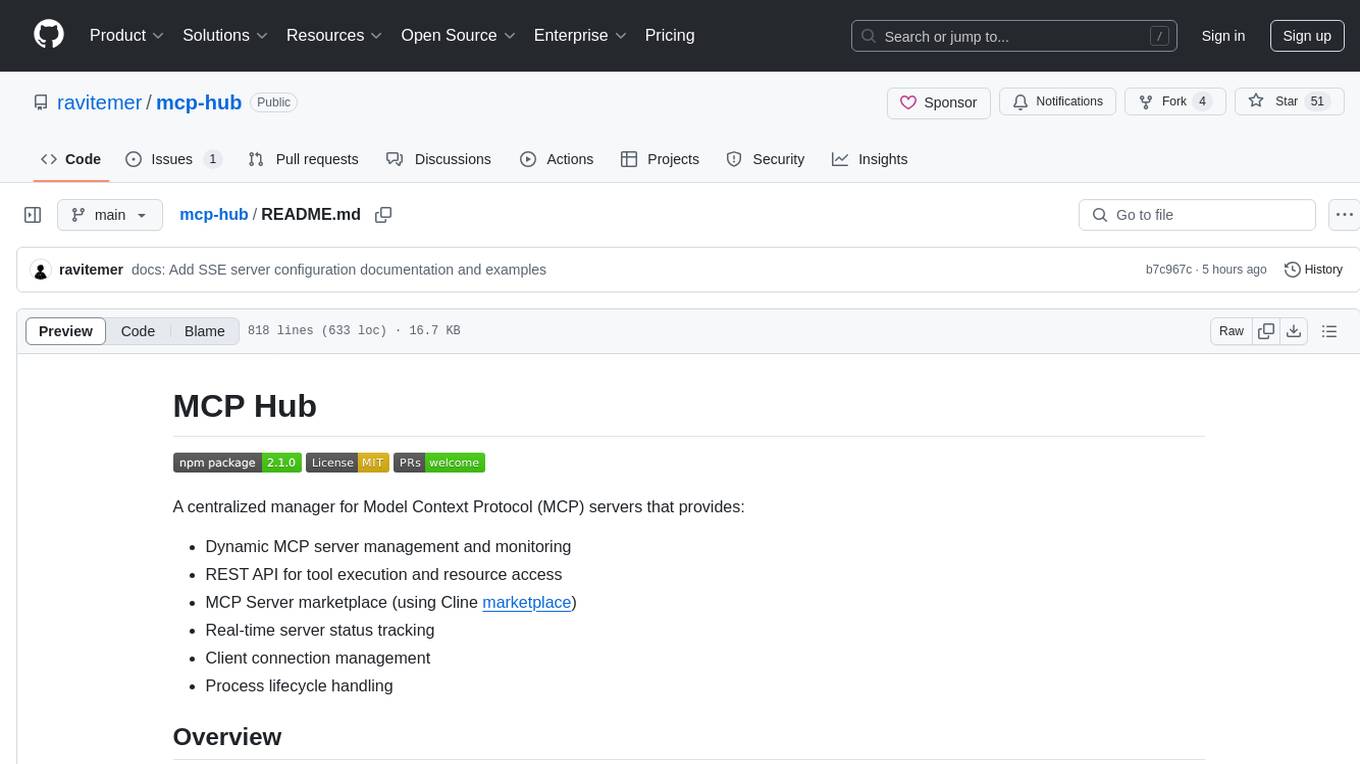
mcp-hub
MCP Hub is a centralized manager for Model Context Protocol (MCP) servers, offering dynamic server management and monitoring, REST API for tool execution and resource access, MCP Server marketplace integration, real-time server status tracking, client connection management, and process lifecycle handling. It acts as a central management server connecting to and managing multiple MCP servers, providing unified API endpoints for client access, handling server lifecycle and health monitoring, and routing requests between clients and MCP servers.
For similar tasks

klavis
Klavis AI is a production-ready solution for managing Multiple Communication Protocol (MCP) servers. It offers self-hosted solutions and a hosted service with enterprise OAuth support. With Klavis AI, users can easily deploy and manage over 50 MCP servers for various services like GitHub, Gmail, Google Sheets, YouTube, Slack, and more. The tool provides instant access to MCP servers, seamless authentication, and integration with AI frameworks, making it ideal for individuals and businesses looking to streamline their communication and data management workflows.
For similar jobs
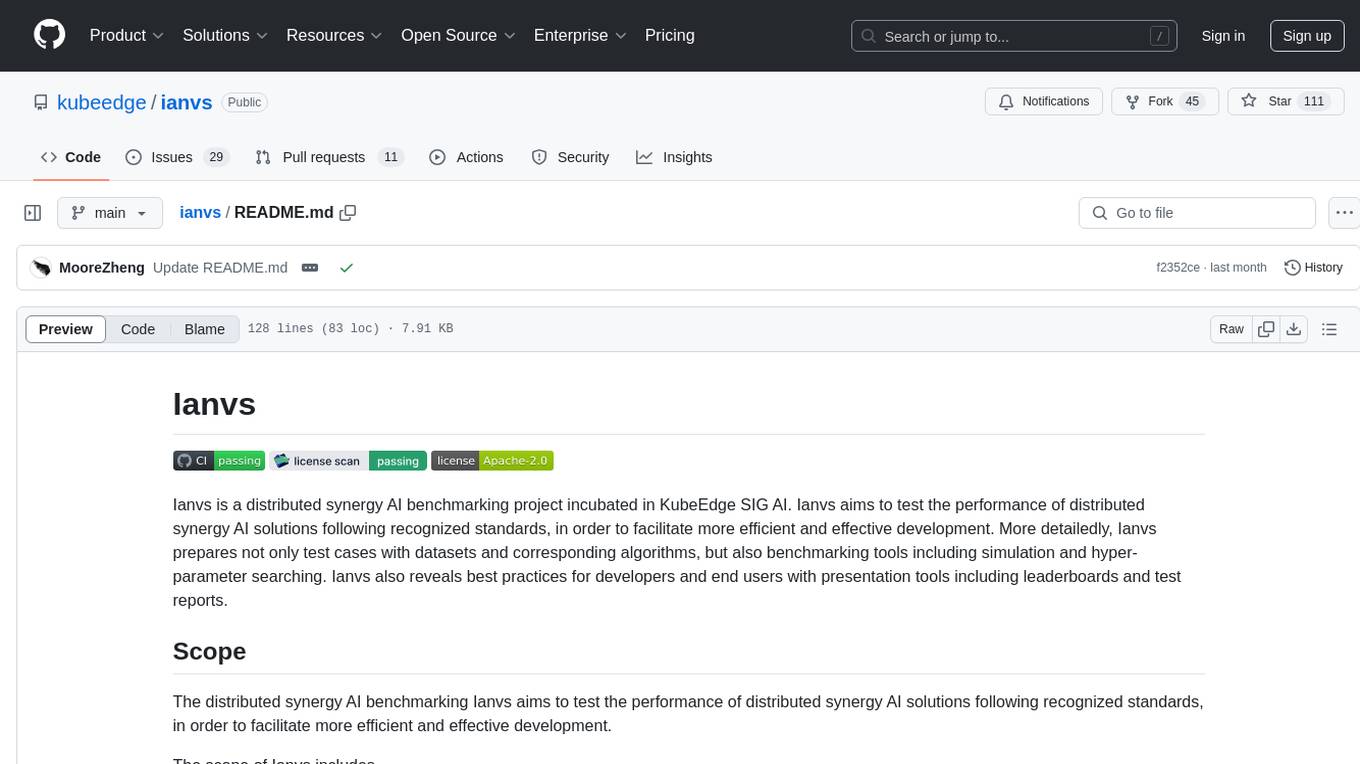
ianvs
Ianvs is a distributed synergy AI benchmarking project incubated in KubeEdge SIG AI. It aims to test the performance of distributed synergy AI solutions following recognized standards, providing end-to-end benchmark toolkits, test environment management tools, test case control tools, and benchmark presentation tools. It also collaborates with other organizations to establish comprehensive benchmarks and related applications. The architecture includes critical components like Test Environment Manager, Test Case Controller, Generation Assistant, Simulation Controller, and Story Manager. Ianvs documentation covers quick start, guides, dataset descriptions, algorithms, user interfaces, stories, and roadmap.

klavis
Klavis AI is a production-ready solution for managing Multiple Communication Protocol (MCP) servers. It offers self-hosted solutions and a hosted service with enterprise OAuth support. With Klavis AI, users can easily deploy and manage over 50 MCP servers for various services like GitHub, Gmail, Google Sheets, YouTube, Slack, and more. The tool provides instant access to MCP servers, seamless authentication, and integration with AI frameworks, making it ideal for individuals and businesses looking to streamline their communication and data management workflows.
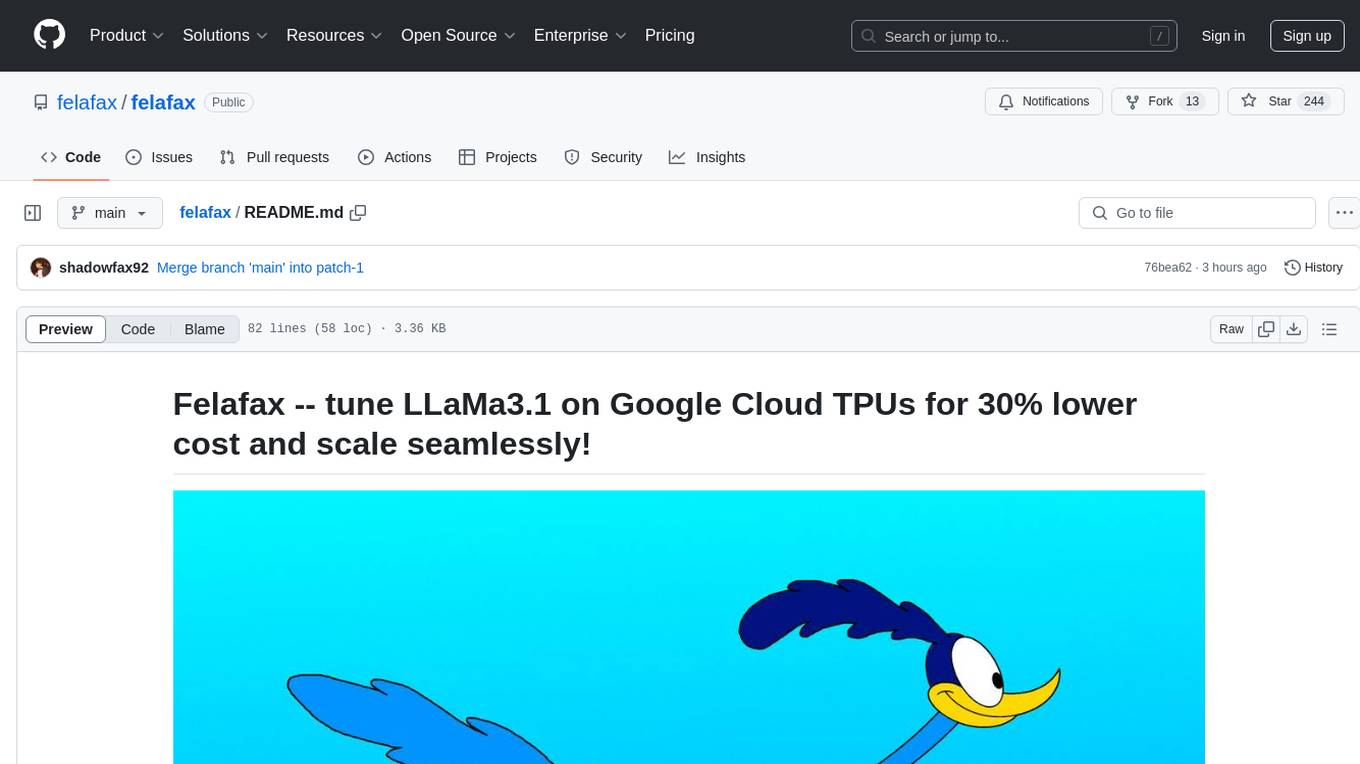
felafax
Felafax is a framework designed to tune LLaMa3.1 on Google Cloud TPUs for cost efficiency and seamless scaling. It provides a Jupyter notebook for continued-training and fine-tuning open source LLMs using XLA runtime. The goal of Felafax is to simplify running AI workloads on non-NVIDIA hardware such as TPUs, AWS Trainium, AMD GPU, and Intel GPU. It supports various models like LLaMa-3.1 JAX Implementation, LLaMa-3/3.1 PyTorch XLA, and Gemma2 Models optimized for Cloud TPUs with full-precision training support.
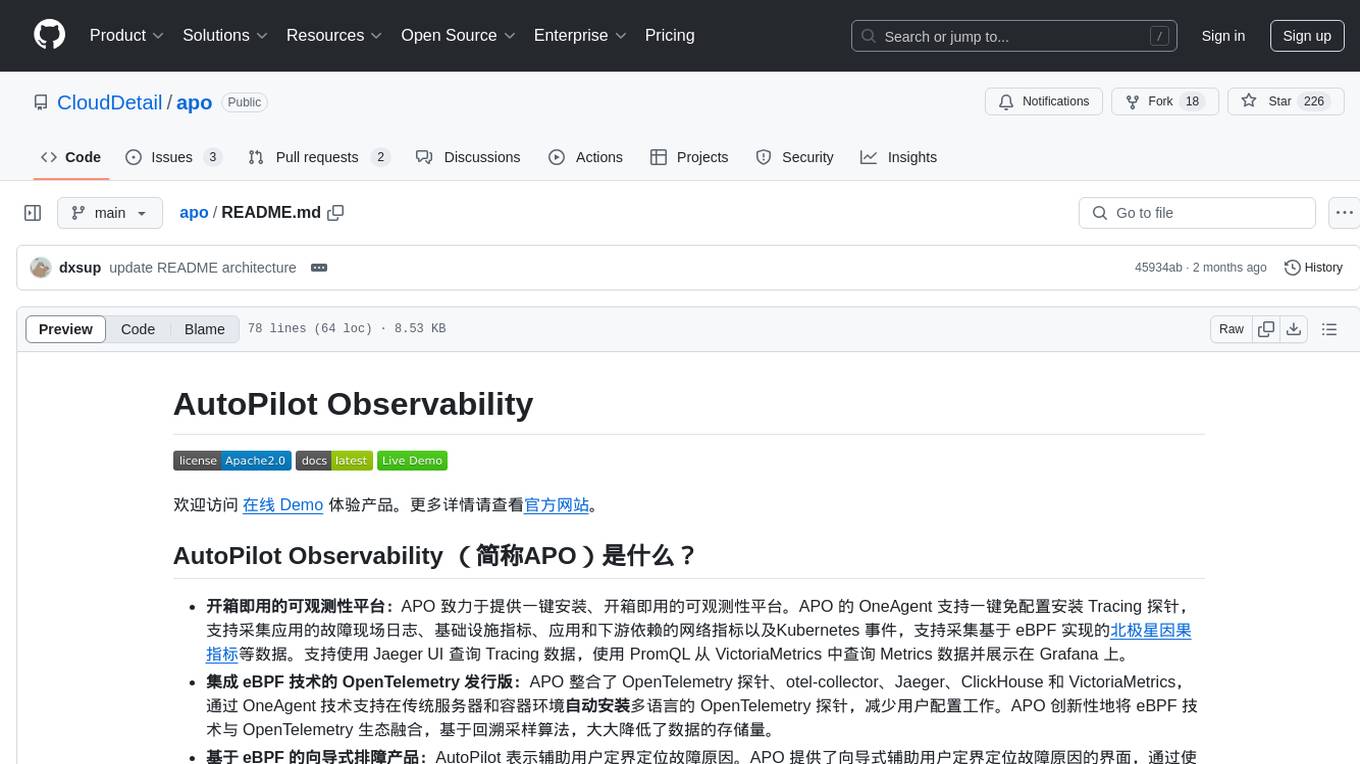
apo
AutoPilot Observability (APO) is an out-of-the-box observability platform that provides one-click installation and ready-to-use capabilities. APO's OneAgent supports one-click configuration-free installation of Tracing probes, collects application fault scene logs, infrastructure metrics, network metrics of applications and downstream dependencies, and Kubernetes events. It supports collecting causality metrics based on eBPF implementation. APO integrates OpenTelemetry probes, otel-collector, Jaeger, ClickHouse, and VictoriaMetrics, reducing user configuration work. APO innovatively integrates eBPF technology with the OpenTelemetry ecosystem, significantly reducing data storage volume. It offers guided troubleshooting using eBPF technology to assist users in pinpointing fault causes on a single page.
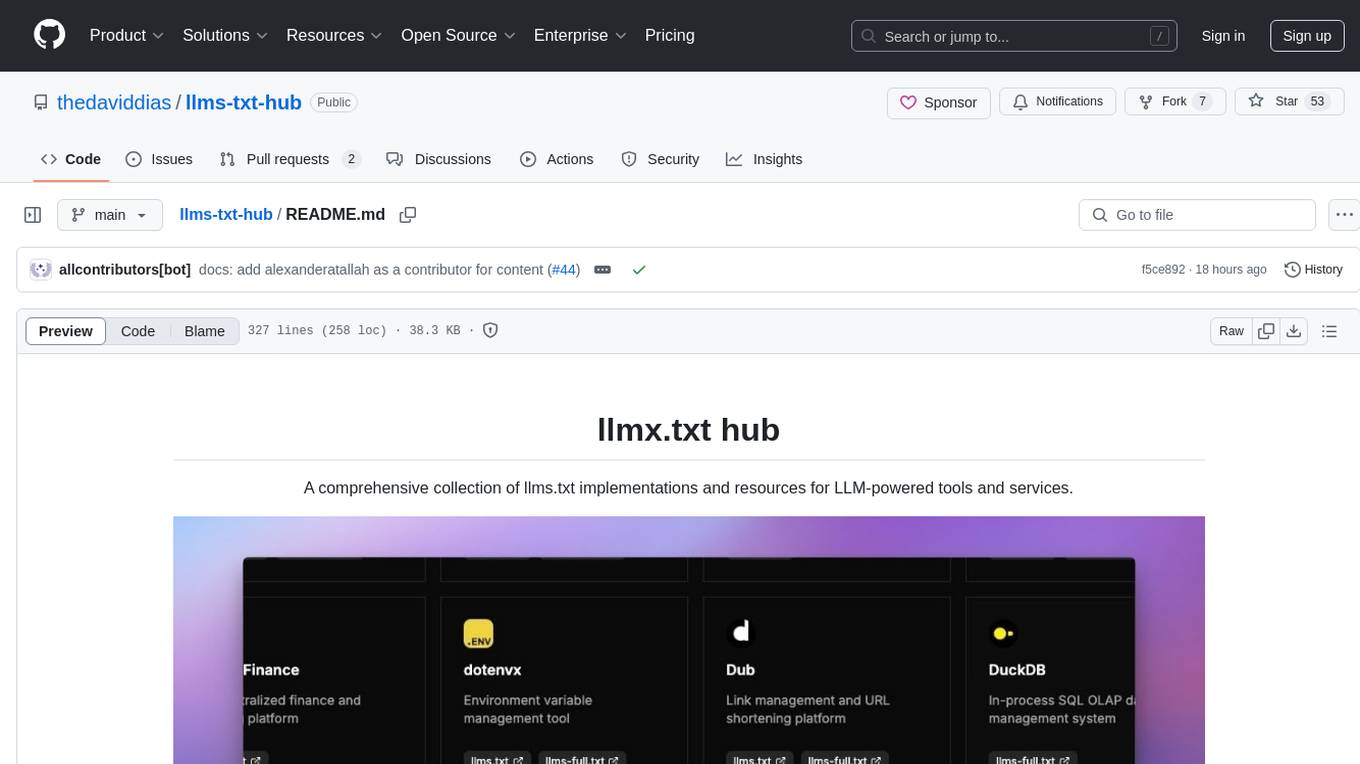
llms-txt-hub
The llms.txt hub is a centralized repository for llms.txt implementations and resources, facilitating interactions between LLM-powered tools and services with documentation and codebases. It standardizes documentation access, enhances AI model interpretation, improves AI response accuracy, and sets boundaries for AI content interaction across various projects and platforms.

kaito
Kaito is an operator that automates the AI/ML inference model deployment in a Kubernetes cluster. It manages large model files using container images, avoids tuning deployment parameters to fit GPU hardware by providing preset configurations, auto-provisions GPU nodes based on model requirements, and hosts large model images in the public Microsoft Container Registry (MCR) if the license allows. Using Kaito, the workflow of onboarding large AI inference models in Kubernetes is largely simplified.

ai-on-gke
This repository contains assets related to AI/ML workloads on Google Kubernetes Engine (GKE). Run optimized AI/ML workloads with Google Kubernetes Engine (GKE) platform orchestration capabilities. A robust AI/ML platform considers the following layers: Infrastructure orchestration that support GPUs and TPUs for training and serving workloads at scale Flexible integration with distributed computing and data processing frameworks Support for multiple teams on the same infrastructure to maximize utilization of resources

tidb
TiDB is an open-source distributed SQL database that supports Hybrid Transactional and Analytical Processing (HTAP) workloads. It is MySQL compatible and features horizontal scalability, strong consistency, and high availability.



